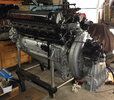I love railroads. Thus when visiting other countries I like to at least do one leg of the travel on rails. And before boarding the train, I go to see the locomotives.
Back in the late 1970s, I visited the UK and travelled vía Brit Rail.
When nosing around the locomotives, I noticed a significant amount were Diesel powered. But the noise they would make was significantly different from the one I had heard in North American engines. The British engines produced a deep rumble that was nevertheless very fast, like a gigantic cat purring.
No Google back then, and the conductor wasn’t very helpful.
Fast forward 40 years, and I was having some beers with some acquaintances. One of them was a Vietnam vet, and he mentioned some boats had an extremely powerful, yet very odd British engine, whose sound resembled a purring cat. The Napier Deltic.
Of course arriving home I immediately Googled it. What an awesome engine! Really out-of-the-box thinking and a prime example of outstanding British engineering.
If you are not familiar with the Deltic please search some YouTube videos.
Back in the late 1970s, I visited the UK and travelled vía Brit Rail.
When nosing around the locomotives, I noticed a significant amount were Diesel powered. But the noise they would make was significantly different from the one I had heard in North American engines. The British engines produced a deep rumble that was nevertheless very fast, like a gigantic cat purring.
No Google back then, and the conductor wasn’t very helpful.
Fast forward 40 years, and I was having some beers with some acquaintances. One of them was a Vietnam vet, and he mentioned some boats had an extremely powerful, yet very odd British engine, whose sound resembled a purring cat. The Napier Deltic.
Of course arriving home I immediately Googled it. What an awesome engine! Really out-of-the-box thinking and a prime example of outstanding British engineering.
If you are not familiar with the Deltic please search some YouTube videos.



